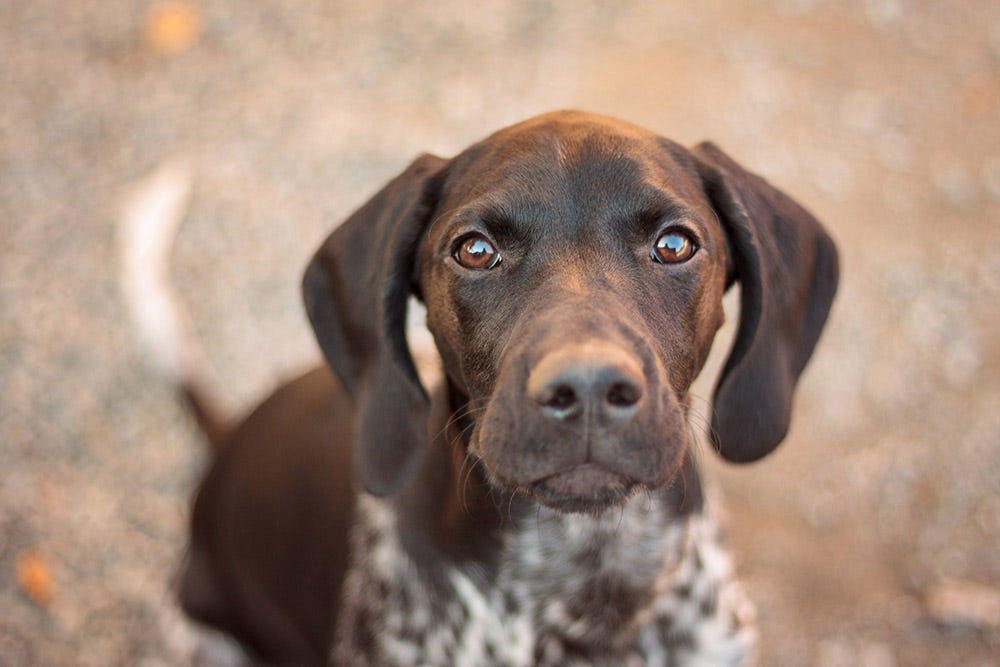First of all, my heartfelt thanks to all of you who sent me good wishes about Max, via comments, emails, and/or notes. It helps a lot to know that people care. But there still is a hole in the room where he used to be.
When I was little, until I was about nine years old, my parents and I lived in an apartment owned by my paternal grandfather. The building had six floors if I remember correctly; we lived at the bottom, my grandparents and my father’s older, unmarried sister lived above us, and there were several other tenants; I didn’t really know any of them. I was born in Germany in 1946, so this was shortly after the war, when food was scarce – it was even rationed. Families received little cards with the weekly amount of allowed food stamped on it – you had to show the card at the grocery store, and when you bought your ration of fat or milk for example, it would be checked off.

My grandfather and a few of his friends leased several hundred acres of forest land to go hunting on the weekends. This wasn’t just for fun but to supplement the available food for our family. When I was little, I was used to seeing dead rabbits, deer, and pheasants hanging in the cellar, next to big wooden bins filled with potatoes, onions, and apples. Enough to last through the winter.
I was two years old when my grandfather acquired a puppy, a hunting dog who wasn’t a pet but a working dog: Senta, a German Shorthaired Pointer. We grew up together; when I was older, it was a bit embarrassing to hear that Senta and I chewed on the same bone, one of the anecdotes that the grown-ups freely shared when the larger family got together for Sunday dinners. I didn’t really mind. Senta belonged to my earliest memories, and she was my best childhood friend. We would romp around in the big, partly wild, garden, and once I was old enough to go to school, she’d faithfully sit at the gate, every day, waiting for me to come back.

On the weekends she’d often be gone. I knew she’d be with my grandfather and his friends who went on a hunting trip, and then it was me who eagerly waited for her to come back. A weekend without Senta always dragged along and was boring. I was so happy when she was back and was ready to play with me again. We’d both dance and jump and hop around, enjoying each other’s company.
And then she got ill: she came down with canine distemper. The vaccine which prevents the disease was developed in the late 1950s and not available when Senta got sick. I think I was around seven years old when this happened, old enough to understand the seriousness of her condition. I knew that she could easily die and stayed by her side as much as I was allowed. It was painful, seeing her so weak and listless and lethargic. She was just lying there, barely able to lift her head or to recognize anybody. My aunt fed her raw eggs, and once Senta was a bit stronger, she got soup with chunks of meat, potatoes, and vegetables. Kibble and canned dog food were not available in Germany at the time, and Senta always ate homemade food. That must have kept her strong: she survived the distemper and got all well. I just read up on canine distemper: one out of two dogs die from the disease, and those who survive often have a permanently damaged nervous system. But my sweet Senta was as good as new! What a relief.
About a year later, Senta was killed by a truck. They didn’t tell me at first; the grown-ups said that Senta was with my grandfather, on a hunting trip. That was common enough and I didn’t miss her. But then my cousin Christa told me: “You know that Senta is dead, don’t you?” I didn’t believe her; she was one year older, often tried to be smarter, and liked to tease me. But no matter who I asked, the uncomfortable reactions of the grown-ups finally convinced me that Christa had spoken the truth.
I couldn’t grasp it. This could not have happened. I didn’t cry, not a single tear the whole day. But then at night it hit me worse than a wall of bricks. I sobbed uncontrollably all night long. My little eight-year-old heart had never felt such pain, and now that I’m 78, losing Senta is still one of the worst events in my life. Yes, I had human playmates and friends, but Senta was special – I was part of her and she was part of me. There was a deep connection that I didn’t have with a human being. The pain was excruciating.
It took me a while to piece together what must have happened; nobody really wanted to talk about it. Apparently, another cousin of mine, Helga who was eight years older than me, had taken Senta for a walk. And then she let her off the leash. Senta must have been on the other side of the road, and when a truck approached, Helga called the dog – who must have tried to cross the street and ran right in front of the truck.
This happened just about 70 years ago. You’d think that the pain would have all but disappeared. And most of the time it has, but it got triggered when I lost my dog. When my sweet Max’s body was wrecked by seizures and I had to let him go, it felt as if a scab was ripped off and an old wound was raw and open again. The pain of losing Senta wasn’t just a memory, but was current once more.
I believe that the physical body is the least important part of who we are, and once life and consciousness etc. leave, it is nothing but an empty shell. The other parts – mind, consciousness, soul, however they might be called – continue. And I believe that every entity, even a rock or a microbe or a galaxy, has some consciousness or interiority, however minute. Maybe I shouldn’t be sad about Max; maybe he is happily playing with all the other furry, four-legged friends I have lost over many years; maybe they'll be waiting for me when it’s my time to cross the threshold. Wouldn’t that be nice…






If I did believe in any afterlife, my pooches would all be there wagging and looking beautiful. thanks Jessica.
We never lose our best friends. I had a dog that was my pal, even when she began to get old..... she'd be there to meet my bus after middle school.
We tried to get a companion dog but the little guy was just too timid. When my cousin took him back, she acted like she was returning a defective / broken DVD player. Typical behavior for my empathy - deficient cousin.